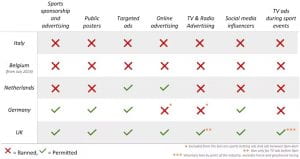By Dr Reece Bush-Evans, Senior Lecturer in psychology and member of the Gambling Research Group at Bournemouth University.
This blog describes a research project made possible by a Strategic Award from the Hub’s Research Innovation Fund, which funds innovative and interdisciplinary research to understand and tackle gambling harms.
LGBTQIA+ individuals experience significantly higher rates of adverse mental, behavioural, and physical health outcomes compared to the general population, including increased substance use and behavioural addictions such as gaming and harmful internet use. They also face significant barriers to accessing healthcare such as prejudice, provider inexperience, lack of trust and fear of stigma, which can result in delayed care, unmet needs, and poorer health-related outcomes. While limited, existing studies also suggest that LGBTQIA+ individuals may experience disproportionately high rates of at-risk and disordered gambling. Yet, findings are often mixed and little is known about individuals’ help-seeking behaviours and access/barriers to gambling support.
This mixed-methods project therefore aimed to (1) Investigate levels of gambling and gambling-related harms within LGBTQIA+ communities, (2) Explore the relationships between gambling, quality of life, mental health, and LGBTQIA+ life stressors, (3) Obtain insight into lived experiences of gambling-related harms within LGBTQIA+ communities, and (4) Explore help-seeking behaviours and access/barriers to support for gambling harms.
What we did: We conducted a mixed-methods study comprising:
- Two online surveys, the first with 1,444 LGBTQIA+ individuals who gamble at least once a month; and the second a comparative sample with 1,472 non-LGBTQIA+ individuals who also gamble at least once a month.
- Semi-stuctured interviews with 31 LGBTQIA+ individuals who gamble at least once a month, and 7 LGBTQIA+ individuals who received residential treatment for gambling-related harms with Gordon Moody.
What we found: The quantitative surveys revealed that LGBTQIA+ people are more likely to engage in gambling as a coping mechanism in response to life stressors linked to identity, stigma, and discrimination. Compared to the cisgender, heterosexual sample, LGBTQIA+ individuals reported significantly higher levels of emotional distress, including shame, guilt, and anguish related to gambling. They were also more likely to experience relational, legal, and health problems as a result of gambling.
A key finding was the strong statistical association between distress caused by life stressors and both the severity of gambling harms and the tendency to use gambling as an emotional escape. These patterns were especially pronounced among transgender individuals and LGBTQIA+ individuals from ethnic minority backgrounds. Transgender participants (n = 82) reported the highest levels of depression and lowest levels of social support and quality of life. Similarly, ethnic minority LGBTQIA+ individuals (n = 200) experienced intersecting forms of marginalisation, including racism, homophobia and transphobia, which increased gambling risks.
We also identified barriers to support among LGBTQIA+ communities. Many LGBTQIA+ individuals in the qualitative study expressed reluctance to seek help, citing fears that services were not inclusive, lacked cultural competence, or were primarily designed for cisgender, heterosexual men. Despite the high rates of harm, there remains a gap in tailored interventions and evidence-based services for this population.
Importantly, social support emerged as a potential protective factor against gambling harm. However, access to such support differed across subgroups. The findings emphasise the need for intersectional approaches in research, policy, and practice to address gambling harms in LGBTQIA+ communities through inclusive, affirming, and community-informed support systems.
Potential impacts: The research has garnered a great deal of domestic and international attention, with various addiction charities and gambling-support services taking note of the importance to cater to marginalised communities, including the LGBTQIA+ community. The findings have already started to shape strategic approaches, public awareness campaigns, and internal processes at a number of organisations. The research has been shared with academics, lived experience, public, and policymakers alike at a number of Parliamentary receptions, engagement events, Pride festivals, and international conferences. The recommendations from the research have the potential to make systemic change (via authentic adoption) by raising awareness of gambling-harm among LGBTQIA+ communities and advertising/developing/updating safe spaces and culturally competent service provision for all.
About the project team:
Dr Reece Bush-Evans is a Senior Lecturer in Psychology at Bournemouth University. Diana Hrynishak and Alex Caton-Bradley are paid Research Assistants and members of the Gambling Research Group at Bournemouth University. Professor John McAlaney is a Professor in Psychology at Bournemouth University. Dr Catherine Talbot is a Senior Lecturer at Bournemouth University, specialising in health and cyberpsychology. Dr Liam Wignall is a Senior Lecturer in Psychology at the University of Brighton.


 In 2020, the UK government announced an overhaul of the Gambling Act to make the laws “
In 2020, the UK government announced an overhaul of the Gambling Act to make the laws “